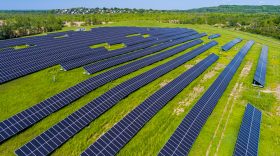SolarWorld, the company that launched the solar trade dispute between the U.S. and China back in 2011, has called upon the U.S. government to close “loopholes” in solar trade rules.
In 2012, the U.S. imposed anti-dumping tariffs and countervailing duties of up to 250% on Chinese-made solar cells after finding that Chinese firms were benefiting from unfair government subsidies and selling solar panels at below-cost prices in the U.S.
But according to SolarWorld, Chinese firms are able to avoid these tariffs by assembling panels with solar cells made in other countries, including Taiwan. The PV panel manufacturer has filed a complaint to the U.S. International Trade Commission and Department of Commerce against China and Taiwan to close this so-called ‘loophole.’
“We’re finishing the job of presenting the facts to our trade regulators to prevent China from further damaging yet another manufacturing industry and another rich base of employment,” said Mukesh Dulani, president of SolarWorld Industries America Inc., based in Oregon.
SolarWorld claims that China does not actually have a production cost advantage, and is still benefiting from unfair government subsidies and selling products at below cost price to gain market share in the U.S.
“China obviously recognizes the key importance of solar-technology manufacturing to future economic competitiveness. But we do, too,” Dulani added. “Therefore, we are once again simply asking our trade regulators to investigate the facts and apply the well-established laws that enable free trade, robust competition and lower long-term pricing. If fair competition can be restored, the U.S. industry will return to growth.”

Quality inspection station in module assembly at the SolarWorld manufacturing facility in Hillsboro, Oregon. Photo Credit: SolarWorld
But the U.S. solar PV industry group opposed SolarWorld’s move, calling for negotiation and action from the Chinese and U.S. governments.
“We oppose today’s escalation of the U.S.-China solar trade conflict…Trade litigation is a blunt instrument and, alone, incapable of resolving the complex competitiveness issues that exist between the U.S. and Chinese solar industries,” said Rhone Resch, president and CEO of the Solar Energy Industries Association.
“It’s time to end this conflict and negotiations must play a role,” he continued. “It’s time for both governments to get in the game and end this conflict – we urge the United States and China to immediately commit to serious, results-driven negotiations.”




